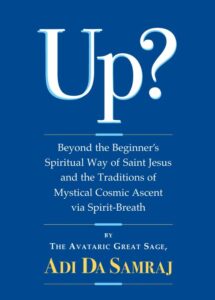Beyond the Beginner’s Spiritual Way of Saint Jesus and the Traditions of Mystical Cosmic Ascent via Spirit-Breath
By The Avataric Great Sage, Adi Da Samraj
(this book was later published as Pneumaton) – Buy the book
INTRODUCTION
by Jonathan Condit, PhD
(Senior Editorial Assistant to Adi Da Samraj)
In the years 2005-2006, the Avataric Great Sage, Adi Da Samraj, wrote two extraordinary books with the arresting titles Up? and Is. In these two books, Adi Da Samraj has summarized, with a great richness of detailed consideration, the entire religious and Spiritual history and effort of humankind. In both books, He describes and criticizes the ordinary pursuit of exoteric (or conventional and socially based) religion, which accounts for the vast majority of all human involvement with religion. Then, in Up?, He goes on to describe esoteric religion in the mode of ‘Spiritual ascent’ (or the effort to ‘go infinitely up’, the effort which is the origin of all Spiritual Mysticism throughout human history) while, in Is, He describes esoteric religion in the mode of world-excluding Transcendental Self-Abiding (or the effort to ‘go deep within’, which effort is found principally in the traditions of Hinduism and Buddhism).
A remarkable feature of both Up? and Is is that Adi Da Samraj not only discusses the Spiritual and Transcendental traditions, He also offers unique renderings of principal texts that epitomize those two fundamental modes of Spiritual search. His renderings are not simply ‘translations’, but fully expository (and, indeed, revelatory) presentations of the, often only cryptically expressed meanings of the traditional texts. In the case of Up?, Adi Da has chosen to render the Spiritual essence of the New Testament Gospels primarily, Mark and Matthew, as well as the so-called ‘Secret Gospel of Mark’. The purpose of Adi Da’s sublimely beautiful rendering of the ‘Gospels’ is not to prove or disprove anything about the presumed historical Jesus of Galilee.*1 Rather, His rendering has the purpose of revealing the true esoteric core of original Christianity (as a tradition originating in the esoteric mode of ‘Spiritual ascent’) whether the ‘Gospels’ are to be regarded as history, as legend, or as a combination of the two.
Both Up? and Is conclude with Adi Da Samraj’s offering of His own Wisdom-Teaching and Realit-Way, with regard (respectively) to Its Spiritual and Transcendental dimensions. His Way ‘the Way of Adidam’ is the Unique Way of Transcendental Spirituality, which acknowledges, and yet surpasses, both the ancient Spiritual esotericism and the ancient Transcendental esotericism. Up? includes Adi Da’s poetic masterpiece Hridaya Rosary (in which He Reveals in detail the true nature of the Spiritual process in His Company), as well as His core Teachings on the fundamental practice of devotion to Him (which is the very foundation of the Way of Adidam).
Taken together, Up? and Is represent an unprecedented ‘map’ of the total human ‘story’ of religion and Spirituality and they, likewise, form the context for coming to know the Unique Divine Offering of the Avataric Great Sage, Adi Da Samraj.
Available at the Beezone Lending Library
